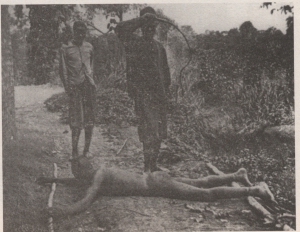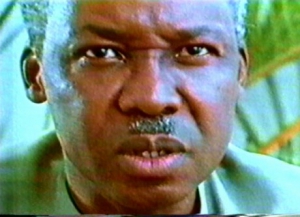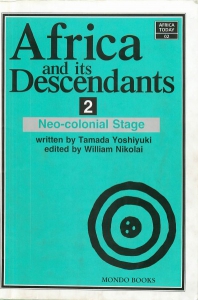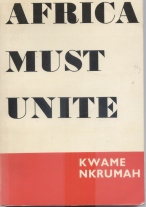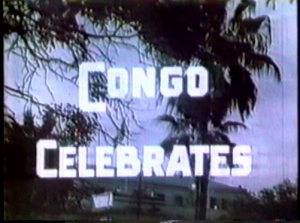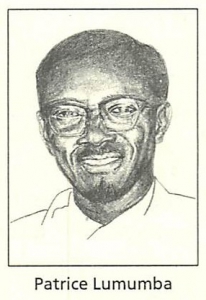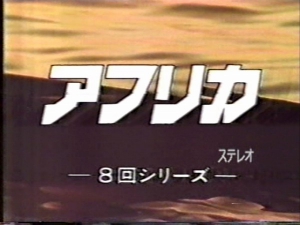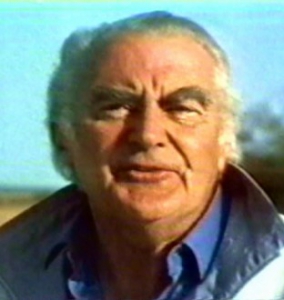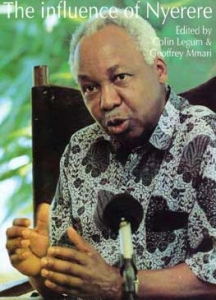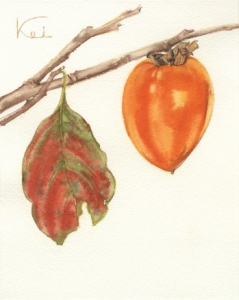11月24日(火)3-4(10:30:-12:00)7回目でした。
<今日>
①エボラとコンゴのまとめを英語で。内容は前回書いたブログを見ながら英語で。↓
奴隷貿易で蓄積された資本で産業革命(Industrial Revolution by capital accumulated through the slave trade)→ヨーロッパの産業化(Industrialization in Europe)→植民地争奪戦(Scramble for Africa)→世界大戦の回避のためにベルリン会議・植民地分割(Berlin Conference and the Division of Africa to avoid world wars)→二度の世界大戦(two world wars)→第三世界の独立(Independence of the Third World)→最初は押さえ込みにかかるも戦略を変更(Strategic change from suppressing colonies at first)、独立の過程を邪魔して後に軍事政権を樹立して間接支配(At first interrupting the independence process, later setting up and controlling military puppet regime)、この過程にアメリカが介入(American interfering with this process )、今日話をした辺りについては、書いてまとめたのがあります。配れなかった資料を末尾に添付しときます。エボラとコンゴをやった今なら読めばわかると思うけど。→Zaire’s turmoil(英語と日本語訳、長~いけどね)
②映像:コンゴの独立・コンゴ危機→ベルリン会議・植民地分割・強制労働・ヨーロッパ世論・アンゴラの綿花栽培→ウガンダの水→エチオピアの旱魃・飢餓(BBCも)ウガンダの水に関連してガーナの初代首相エンクルマの伝記『アフリカは統一する』で書かれている田舎の水の話→エンクルマの伝記(日本語とリンク)
<次回は>
①映像:単一作物を押しつけられたガーナのローリングスとタンザニアのニエレレの言い分
ニエレレ
②映像:ライブエイドの音楽
③トーイックPart 1(残り)、Part 5 (Reading)→Zoomトーイック3_R_P5解説_文法.zipを置いてるんで自分で予めやって来るとわかりやすいと思います。問題は資料①の中にもあるよ。
④時間があれば、アフリカの曲とアフリカシリーズ冒頭
来週、また。
Zaire’s turmoil
Africa and its Descendants 2―Neo-colonial Stage (『アフリカ、その末裔たち 2 ― 新植民地時代』)―written by Tamada Yoshiyuki Edited by William Nikolai (Yokohama: Mondo Books, 1998)
Chapter 3 Contemporary issues: 第3章 今日的諸問題
Zaire’s turmoil 2 ザイールの苦難
The 1995 Ebola virus outbreak put Zaire into the world spotlight again. Reuters reported from Kinshasa (May 16, 1995):
1995年のエボラウイルスの発生によって、再び世界中がザイールに目を向けるようになりました。1995年5月16日、キンシャサからロイター通信が報じています。
The Ebola virus outbreak in Zaire has refocused attention on the vast nation of 40 million people in the heart of Africa that has lurched from one crisis to another since independence from Belgium in 1963 (sic).
The virus, for which there is no known cure or vaccine, has killed at least 64 people.
Many Zaireans are openly angry at the government of President Mobutu Sese Seko, who has ruled unchallenged for most of the past 30 years and, according to critics, salted a way a personal fortune estimated in billions of dollars.
ザイールでエボラウイルスが発生したために、1963年(原文のまま)のベルギーからの独立以来次々と起こる危機に揺れ動くアフリカの中心部にある四千万人の広大な国に再び世界の注意が向けられました。
治療法もワクチンも知られていないため、そのウイルスによって少なくとも64人の死者が出ました。多くのザイール人がモブツ・セセ・セコ大統領の政府に公然と腹を立てています。批評家によると彼は、過去30年間(の大半を、誰の挑戦も受けずに継続的に支配し、推計で数十億ドルもの個人の資産を貯め込んだと言われています。
Two years later in May, 1997, Mobutu fled Kinshasa to Morocco and Laurent Kabila and his rebels proclaimed victory in a seven-month civil war. The victory was cheered by Zaireans tired of the corruption and economic stagnation, and internationally accepted. Kabila renamed Zaire the Democratic Republic of the Congo and began to take office as head of the state, promising to hold elections in April 1999 and to bury the legacy of ousted Mobutu Sese Seko.
2年後の1997年5月に、モブツはキンシャサを追われ、モロッコへ逃亡しました。ローラン・カビラとカビラを支持する反体制勢力は7ヶ月の内戦における勝利を宣言しました。勝利は、腐敗や経済不況にうんざりしていたザイール人に歓迎され、国際的にも受け入れられました。カビラはザイールをコンゴ民主主義共和国と改名し、国の首長として指揮をとり始め、1999年4月に選挙を実施し、排除したモブツ・セセ・セコの負の遺産を葬り去ることを約束しました。
Joseph-Desire Mobutu was born as the son of a hotel cook and grew up in a poor village on the northernmost stretch of the River Congo. He belonged to a minority ethnic group. After a mission school education, he was by turns a soldier and a journalist and worked for a while in Belgium. As independence approached, he approached the colonialists. In June 1960, he became a government minister under Patrice Lumumba. Within months of independence he was at the forefront of an army coup and soon became commander-in-chief.
ジョセフ・デザイヤー・モブツはホテルの料理人の息子として生まれて、コンゴ川流域の最北の貧しい村で育ちました。彼は少数民族に属していました。ミッションスクールを出た後、兵士やジャーナリストをやり、しばらくの間はベルギーで働きました。独立が近づくにつれ、彼は植民地主義者に接近しました。1960年6月に、彼はパトリス・ルムンバの下で政府の閣僚の一人になりました。独立して数ヶ月以内に、彼は軍隊のクーデターの最前線にいて、間もなく最高司令官になりました。
The CIA plotted with Mobutu to eliminate Lumumba, whom Washington misread as pro-Soviet, giving Mobutu $1 million to buy the loyalty of his troops. Lumumba was deposed in August, 1960 and killed by soldiers six months later.
CIAとモブツは、ワシントンがルムンバを親ソ連派だと読み間違えたのですが、ルムンバの失脚を画策し、モブツに100万ドルを渡してモブツ軍を買収しました。ルムンバは1960年8月に退位させられ、その66ヵ月後に兵士によって殺されました。
After U.N. peacekeepers left in 1964, rebels set up an alternative government and soon controlled two-third of the country. Mobutu expelled, imprisoned, and executed his political opponents and rivals, then the U.S. endorsed his 1965 coup. He ended civilian rule and started a nearly 32-year reign over the country with more than 250 ethnic groups scattered over an area equivalent to most of Western Europe.
1964年、国連の平和維持部隊が去った後、反体制派は暫定政府を設立し、すぐに国の3分の2を支配しました。モブツは政敵やライバルを追放し、投獄し、処刑しました。その後、アメリカは1965年のクーデターを支援しました。民政を終わらせ、ほぼ西ヨーロッパと同じ広さに散らばる250を超える民族集団を持つこの国のほぼ32年間にわたる支配を始めました。
He declared his Popular Revolutionary Movement the sole legal party in 1967 and went on to remake the country. He called it Zaire and renamed Josef-Desire into Mobutu Sese Seko Kuku Ngebendu wa za Banga, “the all-powerful warrior who because of his endurance and inflexible will to win sweeps from conquest leaving fire in his wake.”He was routinely elected by 98 per cent of the country and his critics were either bribed, driven abroad or imprisoned. He enforced his rule with imprisonment, torture and murder.
モブツは1967年に、自身の国民革命運動が唯一の合法的な党であると宣言し、国の再建を続けました。モブツは国をザイールと呼び、ジョセフ・ディザイヤーを、モブツ・セセ・セコ・クク・ゲ・ベンドゥ・ワ・ザ・ベンガ、「忍耐と勝利への不屈の意志故に、征服地を颯爽と突き進み、通り過ぎた跡に火を残して行く全知全能の戦士」と改名しました。国民の98%から慣例的に選ばれ、批判する者は買収されるか、国外に追放されるか、投獄されました。投獄と拷問と殺人を武器に支配を強行しました。
Little or nothing was spent on maintaining ports, roads, railways, riverboats, schools, hospitals and mines while millions of dollars were spent transforming his native village into a city. Today the roads in much of the country are so inadequate that the simplest journey can take days.
彼の生まれた村を都市に変えるために数百万ドルが費やされましたが、港、道路、鉄道、汽船、学校、病院および鉱山を維持するためにはほとんど何も費やされませんでした。今日、国のほとんどの道路はひどい状態なので、簡単な旅をするのにも日にちがかかります。
We are taught how most Zaireans were forced to suffer under Mobutu’s regime by a memoir by an American who applied to become a Peace Corps volunteer in 1984 and spent two years in rural Zaire. His article in the Washington Post, included in the Daily Yomiuri (June 6, 1997) shows us his nightmarish experience in the country:
私たちはほとんどのザイール人がモブツ政権下でどのように苦しみを強いられたかを、1984年に海外協力隊に応募して、二年間ザイールの田舎で過ごしたアメリカ人の伝記によって知ることが出来ます。[デイリー・ヨミウリ(1997年6月6日)]に載ったワシントンポストの記事は、その国での悪夢のような体験が記されています。
For two years I was a volunteer in the Kasai region of central Zaire, amid mud huts and barefoot people and poverty as heartbreaking as any on the planet…
二年間、私はザイール中部のカサイ地区でヴォランティアをしました、この地球上の他のどの地域よりも痛ましい、土の小屋と裸足と貧困のまっただ中で・・・
I saw with my own eyes, in the late 20th century, people forced into slavery at gunpoint, compelled to grow cotton to fill the coffers of now deposed dictator Mobutu Sese Seko….
20世紀の後半に、人々が銃に脅されて奴隷のように、綿摘みを強要され、今は失脚しているモブツ・セセ・セコの金庫を一杯にするのを、私はこの目で見ました。
My job in Zaire was to help children stricken by protein deprivation…. I built village fish ponds, bringing supplemental nutrition to rural communities so poor that a single aspirin taxed family budgets. But my work was purely symbolic. The poverty was too profound, too widespread, too deep-and the American aid dismissively small. I helped a few individual families….
ザイールでの私の仕事はたんぱく質の欠如によって病気にかかった子供たちを助けることでした。・・・村の養魚池を作って、田舎の地域に栄養補給をすることでしたが、田舎の地域は貧しくてアスピリンの一錠が家計を圧迫する惨状でした。しかし、私の仕事はまったく象徴的なものでした。貧困はあまりにも深く、広範で深刻すぎました。そしてアメリカの援助はあまりにも小さすぎました。私はそれぞれ何軒かの家族の手助けをしました。
God (or his absence) is in the details. Details like the sobbing faces of village people who came to my house looking for help with their rotting teeth. Even by African standards, medical care in Zaire has been appallingly bad, almost nonexistent. Medicines donated by the United States and other Western countries were routinely hijacked by Mobutu’s forces and resold on the black market at prohibitive prices. Even when aid reached targeted groups there were no guarantees. I once saw an overweighed Zairean soldier – clad in a mismatch of French and American military clothing – take a cup of UNICEF rehydration formula from the hand of a girl suffering from diarrhea and drink it himself….
神(あるいは神の不在)は細部に潜んでいます。腐りかけの歯を何とかしてもらうために私の家に来た村の人々の泣きじゃくる顔のような細部にです。アフリカの基準から言っても、ザイールの医療は驚くほど酷く、ほとんど存在しません。アメリカや他の西側諸国によって寄贈された薬は、モブツ軍によって慣例的に強奪され、法外な価格で闇市場に転売されました。目的の場所に援助物資が届いた時でさえ、保証はありませんでした。私は、以前不釣り合いなフランスとアメリカの軍服を着た兵士が、ユニセフが配給した粉ミルクを溶いてこしらえた飲み物を下痢で苦しむ少女の手から取り上げて、自分で飲んでしまう光景を目の当たりにしました。
In my tiny village, when people were ill, I gave what little I had: aspirin, malaria pills, bandages. And when they came with aching teeth, I gave them what they asked for: gasoline. I’d pour a half-inch shot from my motorcycle carburetor and then watch the 70-year-old woman or 15-year-old boy put the gas to their lips, pour it in and swish it around. By the grim standards of Zaire, this constituted dentistry. A little gas this way, according to the locals, helped kill the infection and reduce the pain. The idea repulsed me, but people kept coming and coming to me -some walking tens of miles, crying, begging, mouths swollen. So I became a tooth doctor. It was better than nothing, I suppose….
私のいた小さな村で、人々が病気になった時、私は持っていたアスピリン、マラリア用の錠剤、包帯などどんな僅かなものでも与えました。また、村人たちが歯痛のため私の所へ来た時には、求められたガソリンをその人たちに与えました。私は、オートバイのキャブレターから半インチのガソリンを注ぎました、そして70歳の女性と15歳の男の子がガソリンを唇にたらし、そのガソリンを口に含んで、シュシュと音を立てるのを見ました。ザイールの容赦のない基準では、これが歯の治療だったのです。地元の人々によると、このように使う僅かなガソリンは感染を防ぎ、痛みを和らげる手助けをするということでした。私はその考えに拒絶反応を見せました。しかし、人々は私の所へ来続けました。口を腫らして、泣きながら、頼むから何とかしてくれと言って、数十マイルも歩いてくる人もいました。だから私は歯医者になりました。何もないよりはいいと思ったのです。
In central Zaire where I lived, it was particularly important for villagers to stay healthy so they could meet the government’s demand for conscripted labor. Every adult male, already struggling to cultivate enough food for his family, was required to plant roughly half an acre of cotton and sell it to the government. Those who wouldn’t or couldn’t plant cotton risked severe fines and savage rifle-butt beatings from soldiers sent out to enforce the rules. It was a system transplanted wholesale from the Belgian colonial days. A Mobutu-controlled monopoly set cotton prices at artificially low levels, then routinely rigged the scales at purchase time to cheat villagers again. I know all this, because in my village the cotton sales were held in my front yard. I watched it all including the myriad beatings, from my doorstep…
私が住んでいたザイール中部では、政府が求める強制労働の要求を満たせるように、村人は健康でいることが特に重要でした。家族の十分な食料を得るために耕すの為に既に充分苦労していたすべての成人男性は、綿をおよそ半エーカー植え、その綿を政府に売るように要求されました。綿を植えない人、または植えられない人々には厳しい罰金や、凶暴なライフル銃の銃身で規則を守らせるために派遣された兵士から鞭打ちの刑を受ける危険がありました。それはベルギーによる植民地時代からそっくり受け継がれた体制だったのです。モブツは独占的に綿の価格を不自然なまでに低い基準に規制し、買い取る際にいつものように目盛りをわざと不正に操作し、村人を再び騙しました。私の村で、綿販売は私の前庭で行われていましたので、ことの子細をすべて知っています。私は無数の鞭打ちを含め、すべてを戸口から見たのです。
All this was made possible by U.S. and European support. In 1977, 1978 and 1984, the United States and France, directly or indirectly, helped rescue Mobutu’s regime from reformist uprisings similar to the one that finally toppled his government. Throughout the 1980s, the United States continued to provide military and economic support to the Mobutu regime, despite solid reports of corruption and gross human rights abuses. Mobutu made the best use of the Cold War, and extracted the maximum of aid from the neo-colonialists. In exchange he kept the Russians and the Cubans out, maintained a certain stability in his domain and produced minerals for the factories of the West.
これはすべてアメリカとヨーロッパの支援によって可能になりました。1977年、1978年および1984年にはアメリカおよびフランスが直接あるいは間接的に、最後にモブツ政府を倒した人たちに似た改革派による暴動からモブツ政権を救う手助けをしました。1980年代の間じゅう、アメリカは、腐敗や夥しい人権侵害についての信頼し得る報告書を入手していたにもかかわらず、モブツの政権に軍事援助と経済援助をし続けました。モブツは冷戦を最大限に利用し、新植民地主義者から最大の援助を引き出しました。見返りとして、モブツは、ロシア人とキューバ人を中に入れず、領土内の安定をしっかりと維持し、西洋の工場向けの鉱物を生産しました。
At the end of the Cold War his personal fortune and national debt reached $6 billion.
冷戦の終わりには、モブツの個人資産と国債が共に60億ドルに達しました。
As foreign pressure grew to stamp out corruption and human rights abuses, his grip on internal politics weakened. He bowed to foreign and domestic pressure for democratic reform in 1990. The 1994 Rwanda genocide, however, gave him a new lease of life, for the West needed him once again. On October 18, 1996, a revolt broke out in the eastern region. The Rwandan-backed rebels led by Kabila and the Alliance of Democratic Forces for the Liberation of Congo-Zaire routed Zaire’s poorly trained and demoralized army, capturing the major eastern border towns of Goma and Bulavu.
外圧によって腐敗や人権侵害が閉め出されるようになるにつれて、国内政治への支配力は弱まりました。モブツは1990年に民主主義的な改革にむけての内外の圧力に屈服しました。しかしながら、1994年のルワンダの大量虐殺でモブツはまた生き延びました。というのも、西洋がモブツをもう一度必要としたからです。1996年10月18日に反乱は東部地域で発生しました。カビラに導かれたルワンダ人の支持する反乱軍、およびコンゴ・ザイール解放民主勢力連合は、あまり訓練されずに士気のあがらないザイール軍を敗走させ、ゴマとブラブなど、東部の境界周辺の主要な町を占領しました。
Bill Clinton conveyed to Mobutu what Ronald Regan made clear to Ferdinand Marcos in the Philippines in 1986 – that there should be a peaceful transition to a new government. On May 17 rebel forces marched into the capital, and two days later Kabila swore the oath as the president of the Democratic Republic of Congo. In an address to the nation, he made clear he would bring democratic change to former Zaire.
ビル・クリントンはモブツに、ロナルド・レーガンが1986年にフィリピンでフェルディナンド・マルコスに明言したこと、つまり武力を行使しない形で平和裡に政権移譲を行なうべきだと伝えました。5月17日、反体制軍は首都に行進し、2日後に、カビラはコンゴ民主共和国の大統領として宣誓しました。国民への演説の中で、カビラははっきりと以前のザイールに民主主義な変化をもたらすと言いました。
Laurent Kabila, 56, somehow escaped death in murderous years of Mobutu’s rule, and vanished into the forests of the province of Kivu and its confines along the Rift Valley and its lakes; the few who went to look for him had little to tell. He had been involved in minor rebellions in Zaire since the 1960s, and longed to unseat Mobutu. In the current rebellion, he served first as a spokesman for the rebels, then was pushed to the front as their leader in October, 1996, perhaps because as a member of Zaire’s Luba people, he would appear to be a neutral party in Hutu-Tutsi conflicts. Now he is present again, and this time as the man to steer the vast country into peaceful waters. It is said that he sometimes said he would be president, but only for a short time and only if the people want him.
ローラン・カビラ(56歳)は、モブツの支配した残酷な時代に、辛うじて死をまぬがれ、キブ州とリフト渓谷沿いの境界線地区と湖畔地区の深い森の中に逃げ込みました。カビラを探した人もいましたが、その人たちからは何の情報も聞かれませんでした。カビラは1960年代からずっと小規模な反乱に参加しており、モブツの追放を切望していました。今回の反乱で初めて反体制の代表者を務め、1996年10月に、その人たちの指導者として前面に推されました。それはカビラがザイールのルバ人の一員として、フツ人とツチ人の間の紛争で、恐らく中立の立場にいる人に見えたからでしょう。今、カビラは再び姿を現わしました。そして、今回はこの広大な国を平和な流れに導く舵取りとして出現したのです。カビラは「人々が自分を求め、短期間である場合に限り、大統領になる」と言うこともあったと報じられています。
Kabila was internationally recognized, but many critics raise the questions of his leadership because of his own weak political base. Some observers think he still has no strategy for the future of Zaire. The United States and some Europeans have been demanding early elections. Julius Nyerere, former president of Tanzania, raises his strong opposition against this attitude (“Pushing Kabila on early election unrealistic" Cf. Chapter One, Section 5):
カビラは国際的に認められていますが、その弱い政治基盤のために、指導力に問題があると批評する人もたくさんいます。まだザイールの将来に対する戦略を持っていないのではないかと考える批評家もいます。アメリカとヨーロッパ諸国は、早期の選挙を要求しています。タンザニアの元大統領ジュリアス・ニエーレレは、早急に選挙をするように圧力をかけることに対して、強く反対しています。(「カビラに早期選挙を強いるのは非現実的」第1章の(5)を参照)
This demand for elections is wrong. People who want to see a democratic process in Zaire should not push Kabila. The country has been devastated and must be built up again from scratch. He has to start over completely. This will take time, just as it has taken time for President Musenveni of neighboring Uganda to recover all these years later from the ruinous legacy of Idi Amin.
この早期選挙の要求は間違っています。民主主義への推移を望むザイールの人々はカビラに無理強いをすべきではありません。国は荒廃し続けており、零から国を再建しなければなりません。つまり、カビラは完全にやり直さなければならないのです。これには、隣国ウガンダのムセンヴェ二大統領が、イディ・アミンが残した壊滅状態から回復するために長い年月を要したように、かなりの時間がかかるでしょう。
Musenveni, who has yet to hold elections after several years in power, may not be a bad example for Kabila. Musenveni has said that 'priority number one’ for Uganda is rehabilitating the country, not multiparty democracy. If Kabila were to say the same thing, I for one would support him. . . .
数年の間政権にいたのちに、選挙をする予定のムセンヴェ二も、カビラにとって悪い手本ではないかもしれません。ムセンヴェニは、ウガンダのために一番に優先すべきは複数政党制の民主主義ではなく、国を修復することであると言いました。もしカビラが同じようなことを言うなら、少なくとも私自身はカビラを支援したいと思います。
If early elections are held, as the United States wants, the parties with money, the parties of Mobutism, will win. So we should forget this nonsense.
もしアメリカが望むように早急な選挙が行われたなら、財力のある党や、モブツを支持する組織が勝つでしょう。だから、私たちは早期選挙などと言う愚挙は考えない方がいいのです。
All of us now in the region are interested in human rights and accountability. None of us, however, naively believe that unprepared elections will somehow accomplish this.
現在、この辺りでは誰もが、人権と説明責任に関心があります。しかしながら、周到な準備もしないで選挙をして、ことが達成すると単純に信じている者などはいません。
He criticized neo-colonial policies which have supported Mobutu:
ニエーレレはモブツを支えてきた新植民地主義政治を批判しています。
Frankly, the United States and Europe should have a little humility. They are not morally qualified to demand of Kabila that he hold elections within months when, for 35 years, they coddled and protected that despot in a tiger-skin cap. Without them, Mobutu would have gone long ago. He was virtually finished politically by 1994, when certain European powers revived him once again for the purpose of protecting their interests in the Great Lakes area, particularly after the Hutus were driven from power in Rwanda.
率直に言えば、アメリカとヨーロッパ諸国は少しは恥というものを知るべきでしょう。過去35年間も虎皮の帽子を被った暴君を甘やかし、支え続けた奴らに、数ヶ月以内に選挙をしろとカビラに要求する道義上の資格などありません。奴らがいなければ、モブツはとっくにいなくなっていたでしょうから。カビラは実質的には1994年までに、政治的には終わっていましたが、特にフツ人がルワンダの政権から追われた後、あるヨーロッパ勢力がタンガニーカ湖周辺の利益を保護する目的で、再びモブツを復活させました。
He adds some advice, both to Kabila and to us:
ニエーレレは、カビラと私たちにいくつかの助言をしています。
If we want to help, we should assist Kabila in establishing basic political structures in the country, including a transitional government and a new constitution, before even thinking about elections.
もし私たちが援助したいなら、選挙について考える前に、暫定政府と新憲 法を含む国の基本的な政治構造を設立していく中でカビラを援助するべきです。
To start with, Kabila has to organize his own political base. What has happened? He has not so much organized a take-over of power as he has been sucked into a power vacuum. He can’t just suddenly have elections. His own group has no money, but others have money, including the scores of political parties already in existence, all of which were organized and funded by Mobutu. . . .
まず第一に、カビラは彼独自の政治基盤を形成しなければなりません。事態はどうなっているのか。権力構造の真空状態に吸い込まれてしまっているので、カビラは組織としての権力の引き継ぎをうまく行なっていません。ですから、早急な選挙は出来ないのです。自分たちの取り巻きに金はありませんが、金のあるグループもありません。既存の多数の政党も含め、そのすべてはモブツが組織し、資金を出したのです。
Basil Davidson regards Zaire’s current turmoil as an invitation to an African solution. He points out that the Belgian colonial power dispossessed the peoples not only of their land and its wealth, but also of their self-esteem and self-responsibility; all power of decision passed into European hands. This dispossession brought disaster. The decolonization of 1960 was supposed to reverse this dispossession, but what happened was that dictatorial structures of government passed into the hands of local agents of foreign interests. This independence was a fake. Over the past ten years or so, widely in Africa, we have seen the rise of a real opposition to this fake independence. This indicates a movement for genuine democracy, i.e., a shift away from centralized government and bureaucracy in favor of local and direct forms of self-administration. Davidson regards Zaire’s case as an example:
バズル・デビッドソンはザイールの今の混乱を、アフリカの問題解決へつながるものとみなしています。デビッドソンはベルギーの植民地勢力がその土地の人々を追い出し、その富を奪うだけでなく、自尊心と自己責任なども侵害したと指摘しています。すなわち、すべての意思決定の力がヨーロッパ人の手に渡ってしまったのです。この意思決定の剥奪が大惨事をもたらすことになりました。1960年の独立で、この意思決定の剥奪を取り戻す予定でしたが、政府の支配構造が外国の利益を優先するアフリカ人職員の手に渡っただけでした。独立はまやかしだったのです。過去10年か10数年の間、アフリカの広い地域で、このまやかしの独立に対する本当の反対運動が沸き起こるのを見てきました。これは本当の民主主義を求める運動、つまり、地方自治と直接的な形態の自治のための中央政府と官僚からの権力移行です。デビッドソンは、ザイールの事例がよい見本だと見ています。
Kabila is good news for African self-respect, even very good news. This may seem a far-out view, but it is based on two strong probabilities. One is that no external major power has anything to gain, in this region, from another long bout of uproar and mayhem. The brutal frenzies of the Cold War are over and done with. The other probability is that this country called Zaire no longer exists as a safe source of plunder. The many and various peoples of Zaire, in short, may at last be within sight of being able to govern themselves for their own benefit. The wasted years that began in these parts a century ago and more may be approaching their end. . . .
カビラはアフリカ人の自尊心にとってという点ではよい知らせで、本当に とてもいい知らせです。奇抜な観方かも知れませんが、その観方は二つの強い見込みに基づいています。一つは、外部の主要な勢力ももはや、また別の騒乱と荒廃を経たのちにこの地域で得られるものがもはや何もないということです。冷戦の残酷な狂乱は過ぎ去り、すべての処置も終わりました。もう一つの見込みは、ザイールと呼ばれるこの国はもはや安全な搾取源として存在していないということです。つまり、ザイールの多くの人々は、ついに自分たちの利益を自分自身で管理することが出来るかもしれないという可能性が見えてきたのです。一世紀前、それよりも数十年前にこの地で始まった無益な歳月は、終わりに近づいているのかもしれないのです。
Davidson’s view is optimistic and he notes that this movement toward local and effective democracy has already begun to show impressive results, such as in Eritrea. He concludes:
デビッドソンの見解は楽天的で、地方重視の、効率的な民主主義に向けた運動が、すでにエリトリアで見られるように印象的な結果を示し始めていると言っています。そして以下のような結論を出しています。
. . .We can look for more evidence of this kind if a Kabila government proves competent in Zaire .
カビラの政府がザイールで仕事が出来るかどうかの証拠をもっと見つけるのは可能です。
The problem in Zaire may, in practice, prove less tough than it must seem. If so, it will be because the sheer incompetence and outrageous corruption of the Mobutu dictatorship have left long-abandoned populations to run their own affairs as best they can. Who, after all, has been running the affairs of the wide province of Kivu – unless local people themselves – during all the years when Kabila had his refuge there? (“Zaire’s Turmoil Invites an African Solution," Cf. Chapter One, Section 5)
実際上、ザイールの問題は見かけより厄介でないとわかるかも知れません。そうであるとしたら、それはモブツ独裁制のひどい堕落と全くの不適格さ故に、長い間見捨てられた人々が出来る限り自分たちのことは自分たちでやれる体制が許されてきたからでしょう。結局、もし、カビラが逃げ延びていた間じゅう、地方の人々が自分たちのことを自分たちでやっていなければ、一体誰が、広大なキブ州の切り盛りをやってきたと言うのでしょうか。(「ザイールの艱難、アフリカ的解決に誘(いざな)う」。第1章の(5)を参照)
Kabila’s success might bring hope for bigger social change and wider economic cooperation, for Zaire, which borders nine countries, created a great economic hole under Mobutu’s rule. A functioning Congo could provide a central infrastructure for business in a large portion of sub-Saharan Africa. The country’s railways and roads could be crucial links between Kinshasa and Cape Town, Maputo and Luanda, Nairobi and Brazzaville, between economic centers north and south, east and west. If Congo’s minerals, which range from diamonds to copper, could be mined efficiently again, the country could grow rich. As Nyerere points out, “If under Kabila, the thinking in what he calls the Democratic Republic of the Congo becomes as integrative as its geography, bringing all the potential wealth to bear – it could be the leader with South Africa of what (South African Deputy President) Thabo Mbeki calls 'the African renaissance."'
カビラが成功すれば、より大きな社会変化とより広範囲の経済協力に希望を見いだせるかもしれません。というのも、九つの国と境を接するザイールは、モブツ支配の下で巨大な経済的の空洞をつくり出していたからです。コンゴが機能的に働けば、サハラ以南のアフリカの大部分のビジネスのための中心となるインフランストラクチュア(基幹施設)が供給される可能性があります。また、国を横断する鉄道と道路が出来れば、キンシャサとケープタウン、マプートとルアンダ、ナイロビとブラザヴィルといった東西、南北の経済の中心地間を結ぶ決定的な交易網になり得ます。もし、ダイヤモンドから銅まであるコンゴの鉱物資源を再びうまく採掘できれば、国が豊かになる可能性もあります。ニエーレレが指摘するように「もしカビラの下で、カビラの言うコンゴ民主共和国での理想が、地理的な面だけでなく、あらゆる面で統合が可能であり、潜在的な富を現実の富に変えることが出来るのであれば、タボ・ムベキ(南アフリカ大統領代行)が『アフリカ・ルネッサンス』を提唱する南アフリカとともに、新生コンゴは指導的役割を果たす国になり得ると思います。」
エンクルマの伝記
イギリスの植民地政府庁がわが国を統治していた全期間に、農村の水の開発がまともにおこなわれたことはほとんどなかった。これがなにを意味するかを、栓をひねるだけで良質の飲料水がえられるのを当然とみなしている読者に伝えるのは、容易ではない。(中略)暑い湿気のある畑でつらい一日の仕事をおえると、男や女は村に帰り、それから、手おけか水がめをもって二時間ものあいだ、とぼとぼと歩いて行かなければならなかった。行きついたところで、沼とほとんど変わらないようなところからでも、塩気のある、ばい菌だらけの水を、そのおけやかめにくめたら、幸運なのだ。それから長い道のりをもどる。洗ったり飲んだりする水、たいていは病気のもとになる水の、とるにたりないほどの量をえるのに、一日に4時間!
国じゅうのほとんどが、ほんとうにこのような状態だったのだ。
前後は→「リチャード・ライトと『ブラック・パワー』」「黒人研究」第55号26-32頁
クラス名簿(Zoomではある方がよさそうやから、学生支援課でもらったファイルからコピーしたよ。)
2020年後期 クラス名簿(48名)(2020年10月6日現在)
| 61200043 | イケムラ ヒロト | 工学部環境応用化学科 | ||||
| 池村 広飛 | 1年 | |||||
| 61200254 | ソネ ケンセイ | 工学部環境応用化学科 | ||||
| 曽根 健聖 | 1年 | |||||
| 61200375 | ニシムラ ハルヒ | 工学部環境応用化学科 | ||||
| 西村 春陽 | 1年 | |||||
| 61200430 | ハマカワ コウヘイ | 工学部環境応用化学科 | ||||
| 濱川 光平 | 1年 | |||||
| 61200441 | ハヤシダ カズヤ | 工学部環境応用化学科 | ||||
| 林田 和也 | 1年 | |||||
| 61200476 | ヒダカ ユウセイ | 工学部環境応用化学科 | ||||
| 日高 祐誠 | 1年 | |||||
| 62180110 | カワノ シヨウヤ | 工学部社会環境システム工学科 | ||||
| 河野 匠哉 | 3年 | |||||
| 62200062 | イワモト ソウマ | 工学部社会環境システム工学科 | ||||
| 岩本 颯真 | 1年 | |||||
| 62200109 | オオツカ コウキ | 工学部社会環境システム工学科 | ||||
| 大塚 恒輝 | 1年 | |||||
| 62200213 | クラヅメ トシナリ | 工学部社会環境システム工学科 | ||||
| 倉爪 駿成 | 1年 | |||||
| 62200259 | サトウ リヨウセイ | 工学部社会環境システム工学科 | ||||
| 佐藤 瞭成 | 1年 | |||||
| 62200471 | ミヤジ ユウト | 工学部社会環境システム工学科 | ||||
| 宮地 優人 | 1年 | |||||
| 63200027 | イイヤマ タカト | 工学部環境ロボティクス学科 | ||||
| 飯山 貴冬 | 1年 | |||||
| 63200030 | イガラシ レン | 工学部環境ロボティクス学科 | ||||
| 五十嵐 廉 | 1年 | |||||
| 63200319 | ナカシマ リク | 工学部環境ロボティクス学科 | ||||
| 中島 陸 | 1年 | |||||
| 63200373 | ホリタ ヒデオミ | 工学部環境ロボティクス学科 | ||||
| 堀田 英臣 | 1年 | |||||
| 63200401 | ミヤ ヨシエ | 工学部環境ロボティクス学科 | ||||
| 宮 佳恵 | 1年 | |||||
| 63200425 | モタニ ケンタ | 工学部環境ロボティクス学科 | ||||
| 茂谷 健汰 | 1年 | |||||
| 63200508 | ワタナベ タクヤ | 工学部環境ロボティクス学科 | ||||
| 渡辺 拓哉 | 1年 | |||||
| 64200222 | カミヤ ヒョウ | 工学部機械設計システム工学科 | ||||
| 神谷 彪 | 1年 | |||||
| 64200271 | ソノダ コウダイ | 工学部機械設計システム工学科 | ||||
| 園田 高大 | 1年 | |||||
| 64200299 | タカハシ コウジ | 工学部機械設計システム工学科 | ||||
| 高橋 輝至 | 1年 | |||||
| 64200356 | ニシダ ツバサ | 工学部機械設計システム工学科 | ||||
| 西田 大翼 | 1年 | |||||
| 64200387 | ハヤシ ジユンヤ | 工学部機械設計システム工学科 | ||||
| 林 隼矢 | 1年 | |||||
| 64200518 | ヤガサキ リユウヘイ | 工学部機械設計システム工学科 | ||||
| 矢ケ崎 龍平 | 1年 | |||||
| 64200523 | ヤマガ トモヤ | 工学部機械設計システム工学科 | ||||
| 山鹿 友也 | 1年 | |||||
| 65160180 | サイトウ タイチ | 工学部電子物理工学科 | ||||
| 齊藤 太一 | 4年 | |||||
| 65200186 | クロギ アヤミ | 工学部電子物理工学科 | ||||
| 黒木 彩心 | 1年 | |||||
| 65200371 | ナガタ ジユンペイ | 工学部電子物理工学科 | ||||
| 永田 惇平 | 1年 | |||||
| 65200384 | ナカタケ キヨウタ | 工学部電子物理工学科 | ||||
| 中武 杏太 | 1年 | |||||
| 65200409 | ハシグチ リト | 工学部電子物理工学科 | ||||
| 橋口 理斗 | 1年 | |||||
| 65200418 | ヒグチ レン | 工学部電子物理工学科 | ||||
| 樋口 蓮 | 1年 | |||||
| 66190222 | キリハラ ヒロキ | 工学部電気システム工学科 | ||||
| 桐原 拓希 | 2年 | |||||
| 66190253 | クリタ ワタル | 工学部電気システム工学科 | ||||
| 栗田 亘 | 2年 | |||||
| 66200060 | オゼキ タイセイ | 工学部電気システム工学科 | ||||
| 尾関 泰正 | 1年 | |||||
| 66200183 | タムラ リユウスケ | 工学部電気システム工学科 | ||||
| 田村 竜佑 | 1年 | |||||
| 66200288 | ニシカワ リヨウ | 工学部電気システム工学科 | ||||
| 西川 遼 | 1年 | |||||
| 66200332 | ヒガシ コウシロウ | 工学部電気システム工学科 | ||||
| 東 香士朗 | 1年 | |||||
| 66200451 | モリ カイヤ | 休学 | 工学部電気システム工学科 | |||
| 森 海也 | 1年 | |||||
| 67200018 | アマキ ダイスケ | 工学部情報システム工学科 | ||||
| 天木 大介 | 1年 | |||||
| 67200146 | オシカワ リヨウ | 工学部情報システム工学科 | ||||
| 押川 陵 | 1年 | |||||
| 67200184 | カワバタ アオイ | 工学部情報システム工学科 | ||||
| 川畑 葵 | 1年 | |||||
| 67200212 | クシマ リュウヤ | 工学部情報システム工学科 | ||||
| 櫛間 龍也 | 1年 | |||||
| 67200230 | コバヤシ リヨウスケ | 工学部情報システム工学科 | ||||
| 小林 良輔 | 1年 | |||||
| 67200294 | スギモト ダイチ | 工学部情報システム工学科 | ||||
| 杉元 大地 | 1年 | |||||
| 67200333 | タナカ シンノスケ | 工学部情報システム工学科 | ||||
| 田中 慎乃介 | 1年 | |||||
| 67200368 | トダカ ヨシヒコ | 工学部情報システム工学科 | ||||
| 戸高 快彦 | 1年 | |||||
| 67200528 | ヨシオカ シユン | 工学部情報システム工学科 | ||||
| 吉岡 駿 | 1年 | |||||
